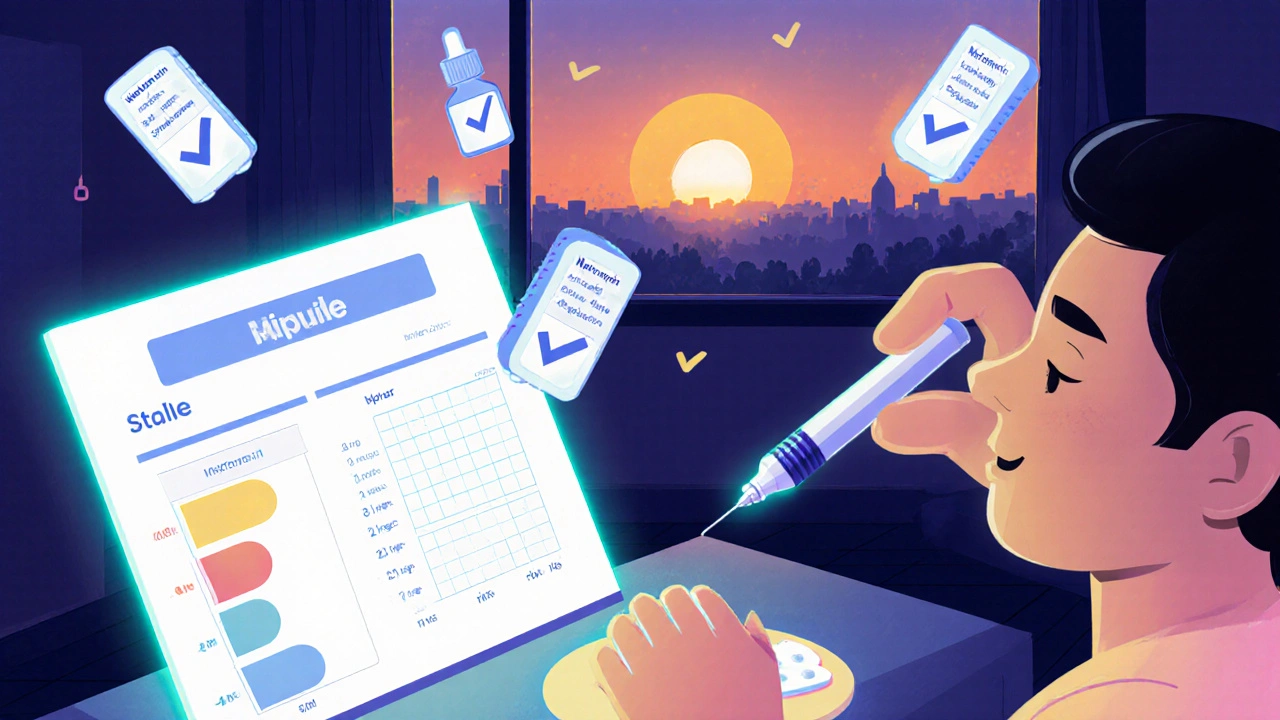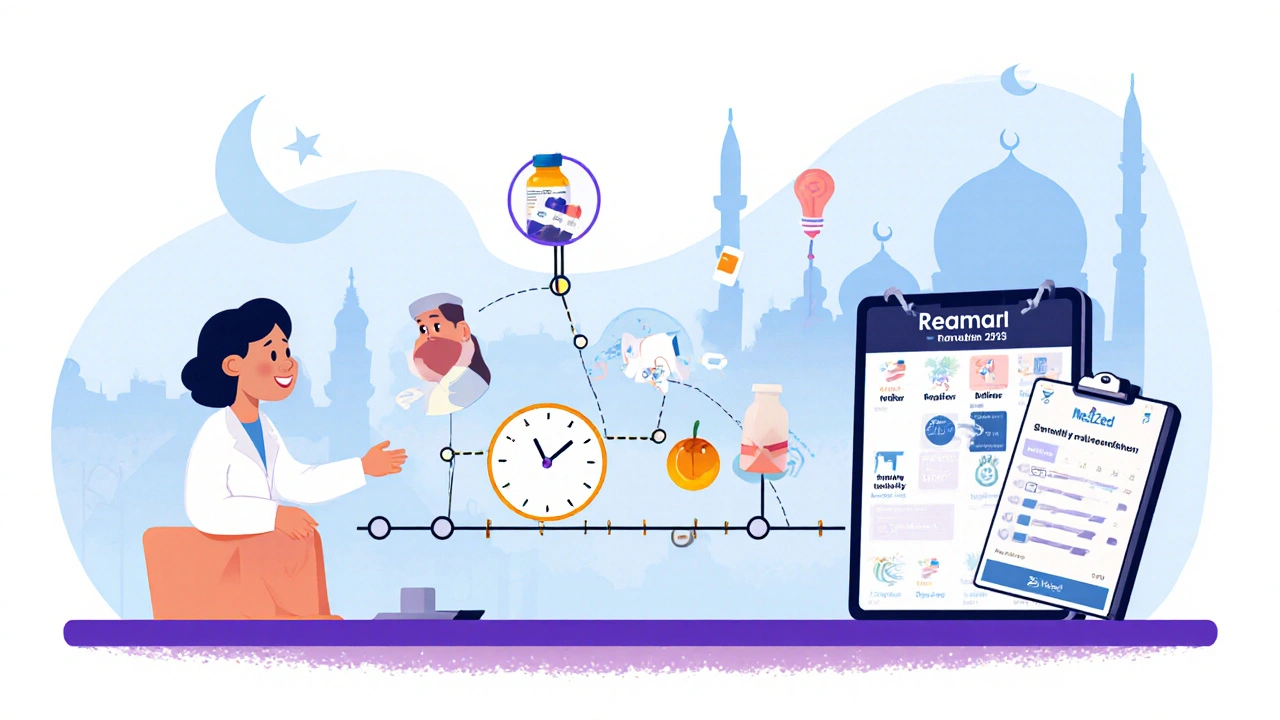Fasting Medication Timing Calculator
Medication Timing Calculator
Enter your medication schedule and fasting times to determine safe dosing times during religious fasting periods.
Recommended Timing
Important Safety Note
Always consult your doctor or pharmacist before adjusting medication schedules. This tool provides general guidance only.
When you're fasting for religious reasons, taking your daily pills can feel impossible. You can't swallow anything from sunrise to sunset-no food, no water, no medication. But what if skipping your pills could put your health at risk? For millions of people around the world, especially Muslims observing Ramadan, this isn't a hypothetical dilemma. It's a daily reality. The good news? You don't have to choose between faith and health. With the right planning, most medications can be safely taken during fasting periods-without breaking your fast.
How Fasting Changes Medication Needs
Religious fasting isn't just about skipping meals. It's a structured period of abstaining from everything that enters the body through the mouth, including oral medications. For Muslims during Ramadan, this means no pills, no liquids, no chewing gum from dawn until sunset. That’s 14 to 18 hours a day, depending on the season and location. In Canada, some Muslims fast nearly 17 hours in summer months. In the UK, it’s typically 15 to 16 hours during Ramadan 2025. The problem isn’t just timing. It’s absorption. Many drugs need food to be absorbed properly. Others must be taken on an empty stomach. Some are designed to release slowly over 12 or 24 hours. When you shift your eating window, you shift how your body handles medicine. A blood pressure pill taken at 8 a.m. might not last until 8 p.m. if you’re not eating. A diabetes drug taken at lunch could cause dangerous low blood sugar if you skip dinner.One Dose a Day? Easy Adjustment
If you take just one medication daily-like a statin for cholesterol or a single daily blood pressure pill-the fix is simple. Move it to either Suhoor (the pre-dawn meal) or Iftar (the sunset meal). Both are acceptable under most religious guidelines. The key is consistency. Pick one time and stick with it. Don’t switch between Suhoor and Iftar randomly. Your body needs predictability to maintain steady drug levels. For antibiotics, follow the label. Some need food. Take them with Iftar. Others need an empty stomach. Take them 30 minutes before Suhoor. Don’t guess. Check the packaging or ask your pharmacist. Many people assume all antibiotics are the same. They’re not. Amoxicillin? Fine with food. Doxycycline? Must be taken alone. Getting this wrong can make the drug useless-or cause stomach damage.Two Doses a Day? Split Them
Most chronic medications are taken twice daily. Think: metformin for diabetes, lisinopril for blood pressure, or levothyroxine for thyroid issues. Here’s how to handle it:- Take the first dose at Suhoor (just before sunrise)
- Take the second dose at Iftar (right after sunset)
Three or More Doses? Time for a Change
If you’re on three or four pills a day-like insulin, certain antibiotics, or pain meds-this gets tricky. You can’t realistically take a pill at 8 a.m., 2 p.m., and 8 p.m. when you’re not eating from dawn to sunset. That’s where your doctor steps in. Many medications have longer-acting versions. Instead of taking metformin three times a day, you might switch to extended-release metformin once a day. Instead of multiple daily insulin shots, you might use a long-acting insulin like glargine with a single daily dose. Your doctor might even switch you to a different drug entirely. For example, methimazole for hyperthyroidism is taken twice daily-perfect for Suhoor and Iftar. Propylthiouracil? Needs six doses a day. That’s not feasible during fasting. Don’t try to squeeze your old schedule into a fasting window. It won’t work. And it could be dangerous. A 2023 study found that 23.7% of diabetic patients on unchanged medication regimens during Ramadan experienced hypoglycemia. That’s more than one in five. That’s not just inconvenient. It’s life-threatening.
What About Non-Oral Medications?
Not all medications go in your mouth. And good news: most non-oral forms are allowed during fasting.- Injections (insulin, antibiotics, vaccines) - Permitted
- Inhalers (for asthma or COPD) - Permitted
- Eye drops, ear drops, nasal sprays - Permitted
- Topical creams and patches - Permitted
- Suppositories - Permitted
Hydration and Nutrition Matter More Than You Think
Fasting isn’t just about skipping meals. It’s about surviving 16 hours without water. If you’re on diuretics (water pills), blood pressure meds, or kidney medications, dehydration becomes a real risk. Especially in summer, when days are long and hot. Your body needs fluids to process drugs. If you’re dehydrated, your kidneys can’t filter medications properly. That can lead to toxicity. For example, NSAIDs like ibuprofen can damage your kidneys if you’re not drinking enough. Same with metformin-dehydration increases the risk of lactic acidosis. Plan your hydration. Drink plenty of water between Iftar and Suhoor. Avoid caffeine and sugary drinks. They make you thirstier. Eat foods with high water content-cucumbers, melons, soups. Avoid salty snacks at Iftar. They’ll make you crave water you can’t have.When to Talk to Your Doctor
Don’t wait until Ramadan starts to figure this out. Start planning 4 to 6 weeks ahead. That’s what Johns Hopkins Aramco Healthcare recommends. Use that time to:- Review all your medications with your doctor or pharmacist
- Ask if any can be switched to once-daily or extended-release forms
- Confirm which medications are safe to take during fasting hours
- Get a written plan for Suhoor and Iftar timing
- Ask about emergency signs-like dizziness, confusion, extreme fatigue-that mean you should break your fast

Religious Guidance and Medical Advice Don’t Have to Conflict
Some people believe taking any pill breaks the fast. Others are told by their imam that only food and drink count. The truth? Most Islamic scholars agree that medications taken for health reasons don’t invalidate the fast-especially if they’re not food or drink. The Islamic Medical Association of North America is releasing new guidelines in late 2024 to help clarify this. Talk to both your doctor and your religious leader. Not to argue. To collaborate. Many mosques now have health clinics during Ramadan. Some even offer free medication reviews. Use them.What’s New in 2025?
The world is catching up. In 2023, 68% of major drug companies included Ramadan guidance in their patient materials. In 2019, it was just 42%. Pharmacy schools in the U.S. now teach religious fasting in 73% of their programs. And tech is helping too. A new app called MedZed launched in February 2024. It syncs with your electronic health record and sends you alerts: “Take your blood pressure pill at 5:30 a.m.” or “Your insulin is due after sunset.” It even tracks your blood sugar if you’re diabetic. The NHS in the UK now has official Ramadan medication guidelines. So do the American Diabetes Association and the Canadian Pharmacists Journal. This isn’t fringe advice anymore. It’s standard care.Final Rule: Never Guess. Always Ask.
There’s no one-size-fits-all answer. Your meds, your health, your faith-these are personal. What works for your neighbor might not work for you. Don’t rely on social media tips or old advice from a cousin. Don’t stop your meds because you’re afraid of breaking your fast. And don’t keep taking them the same way if you feel dizzy, weak, or unwell. The safest path? Plan early. Talk to your doctor. Ask your pharmacist. Know your options. And remember: your religion encourages you to protect your health. The Prophet Muhammad said, “Do not harm yourself or others.” That includes your body.Can I take my pills during fasting hours if I’m not eating or drinking?
No. Most religious traditions, including Islam, consider taking oral medications during fasting hours as breaking the fast. But you don’t need to skip your meds. Most can be safely moved to before dawn (Suhoor) or after sunset (Iftar). Always check with your doctor or pharmacist to adjust timing properly.
Are injections and inhalers allowed during fasting?
Yes. Injections, inhalers, eye drops, nasal sprays, skin patches, and suppositories do not break the fast. These are not considered food or drink, and they’re permitted under most religious interpretations. Insulin users should continue their injections as prescribed-stopping them is dangerous.
What if my medication needs to be taken with food?
If your medication requires food for proper absorption, take it with your Iftar or Suhoor meal. For example, antibiotics like amoxicillin should be taken with food. But if it needs to be taken on an empty stomach (like doxycycline), take it 30 minutes before your meal. Your pharmacist can help you adjust timing without compromising effectiveness.
Should I stop my diabetes meds during Ramadan?
Never stop diabetes medication without medical advice. Many people with diabetes fast safely by switching to once-daily long-acting insulin or adjusting oral meds like metformin. But 23.7% of those who don’t adjust their meds experience dangerous low blood sugar. Work with your doctor 4-6 weeks before Ramadan to create a safe plan.
How do I know if my medication schedule is safe during fasting?
Ask your pharmacist or doctor to review each medication by name. They’ll check if it’s immediate-release or extended-release, whether it needs food, and how long it lasts in your body. Most hospitals and pharmacies now have Ramadan-specific guidelines. If your provider doesn’t know, ask them to consult the NHS or American Diabetes Association’s official resources.


Comments (15)
Tiffany Fox
November 28, 2025 AT 00:49Just took my metformin with iftar last week-no issues. Seriously, don’t overthink it. Pharmacist said most stuff is fine if you shift it to dawn or dusk.
ka modesto
November 29, 2025 AT 21:27I used to panic about my blood pressure meds during Ramadan until my pharmacist showed me the extended-release versions exist. Now I take mine at suhoor-no crashes, no dizziness. Life changed.
Luke Webster
November 30, 2025 AT 09:57This is exactly the kind of practical, faith-affirming guidance we need more of. Too many people assume religion and medicine are at war. They’re not. The Prophet said ‘seek treatment,’ and modern pharmacology just gives us better tools to do it right. Kudos to the author for laying this out so clearly.
Chelsey Gonzales
December 1, 2025 AT 12:44omg i had no idea inhalers were okay during fast?? i’ve been skipping my asthma puff for years bc i thought it ‘broke’ the fast. this might’ve saved my lungs lmao
Charity Peters
December 3, 2025 AT 08:29My mom takes insulin. She’s been fasting for 30 years. She just does it with her doctor’s plan. Simple.
Holly Lowe
December 5, 2025 AT 03:02Imagine if your meds were a playlist and Ramadan was the perfect mixtape-some tracks need to be played at sunrise, others at sunset. No skipping beats. No skipping doses. Just sync it right and your body throws a damn party.
Sarah Khan
December 5, 2025 AT 08:09The real revolution here isn’t the timing of pills-it’s the normalization of religious accommodation in medical infrastructure. For decades, healthcare systems treated fasting as an inconvenience, not a cultural variable. Now we have NHS guidelines, pharmacy training, even apps like MedZed. That’s not just clinical-it’s ethical. It’s recognizing that health isn’t universal, it’s contextual. And that’s beautiful.
Keith Avery
December 5, 2025 AT 17:53Let’s be real-this article reads like a corporate brochure for Big Pharma. Of course they want you to switch to extended-release drugs. More profit. And don’t get me started on ‘pharmacists trained for Ramadan’-that’s just marketing spin wrapped in cultural sensitivity. The real solution? Don’t fast if you’re on meds. Simple.
Tressie Mitchell
December 7, 2025 AT 08:32You people are pathetic. You want to fast, but you also want your pills? That’s not devotion-that’s entitlement. If your religion requires you to take chemicals to survive, maybe your faith is too weak to endure a little discomfort. Real believers don’t need extended-release metformin.
Faye Woesthuis
December 8, 2025 AT 18:19Stop enabling lazy Muslims. If you can’t handle skipping a pill for 16 hours, you shouldn’t be fasting. This isn’t a medical guide-it’s a surrender letter.
MaKayla Ryan
December 10, 2025 AT 02:30Why does America always have to make everything about ‘accommodation’? In my country, people fast and deal with it. No apps, no special pills, no excuses. This is weak.
Kelly Yanke Deltener
December 11, 2025 AT 23:32I used to be like you-thinking I could ‘adjust’ my meds. Then I ended up in the ER with low blood sugar at 3 a.m. during Ramadan. No one warned me. No one cared. Now I don’t fast. And I’m not ashamed. My body came first.
Crystal Markowski
December 12, 2025 AT 14:00If you’re reading this and you’re nervous about fasting with meds-you’re not alone. But you’re not broken either. Talk to your doctor. Talk to your imam. Take the time. You deserve to honor both your faith and your health. You’re not choosing one over the other. You’re choosing both.
Cindy Burgess
December 13, 2025 AT 08:09While the author's assertions regarding the permissibility of non-oral pharmaceuticals during periods of ritual abstinence are substantiated by contemporary fiqh rulings, the conflation of pharmacokinetic principles with theological interpretation lacks rigorous scholarly grounding. Furthermore, the uncritical citation of institutional guidelines as authoritative presumes a homogeneity of Islamic jurisprudential schools which does not exist. The recommendation to consult a pharmacist, while pragmatically useful, risks delegating religious authority to non-theological actors.
Kelly Library Nook
December 15, 2025 AT 08:00It is noteworthy that the article fails to address the legal liability implications for healthcare providers who advise medication timing adjustments during religious fasting periods. In jurisdictions where the standard of care requires strict adherence to FDA-labeled dosing regimens, deviating from these instructions-even with patient consent-may constitute negligence. The recommendation to ‘consult your pharmacist’ is legally insufficient without documented, evidence-based protocols approved by institutional review boards. This piece is well-intentioned but dangerously incomplete.